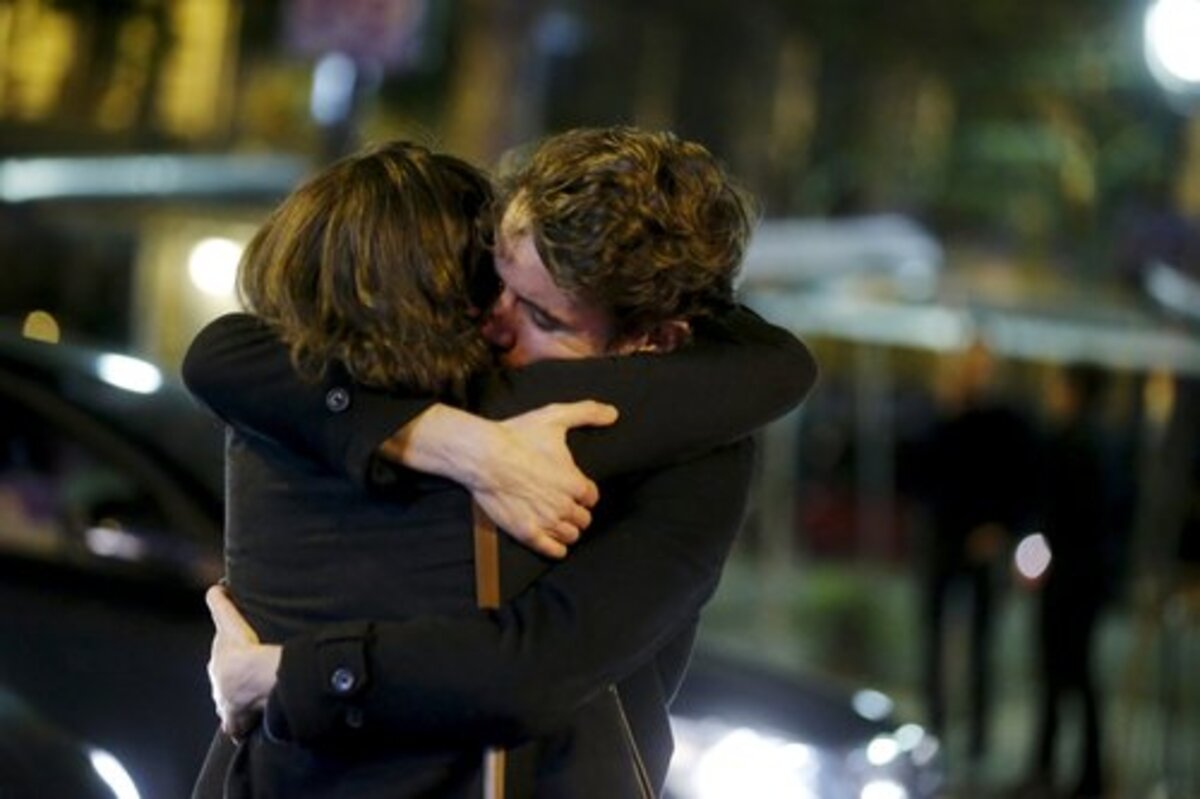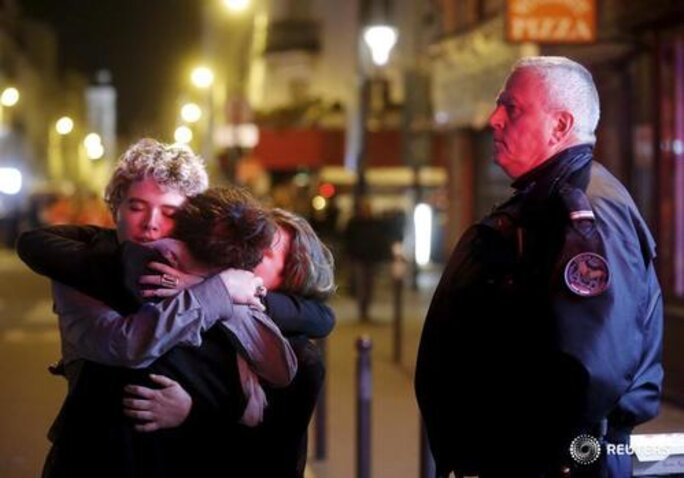At least 129 victims died in the terrorist attacks carried out on Friday evening within 25 minutes of each other at sites in central Paris and close to the Stade de France stadium.
(This report was last updated at 11 p.m. CET on Saturday November 14th 2015)
The latest toll was announced by senior Paris public prosecutor François Molins on Saturday evening, who said 352 people had been wounded in the gun and bomb attacks, of whom 99 were a serious condition.
A number of foreign nationals were reported to be among the dead, although the information has not been confirmed by the French authorities. They include an Algerian, a Briton, two Belgians, one Portuguese, two Romanians, a Spaniard and two Tunisians.
Seven terrorists also died, six of them by blowing themselves up.
The Paris public prosecutor said the attacks began at 9.20 p.m. when a suicide bomber blew himself up beside the Stade de France sports stadium north of the capital, where about 80,000 people were gathered for a friendly football match between France and Germany. Also present was President François Hollande. Minutes later several restaurants and bars were targeted by gunmen in the 10th and 11th arrondissements in central Paris.
The deadliest of the attacks was at Le Bataclan music hall where several gunmen shot dead at least 82 people among the audience of a concert by US band Eagles of Death Metal.

Enlargement : Illustration 1

A statement issued in the name of the Islamic State group (IS), said it had “minutely” planned the attacks in retaliation for France’s role in targeting it in air raids over Iraq and Syria.
Prosecutor Molins said the authorities believed the terrorists were divided into three separate teams. He confirmed that the arrests of five people in Belgium on Saturday were linked to the events in Paris, and were prompted by investigations into the origins of a car registered in Belgium and abandoned by the gunmen who attacked the Bataclan concert venue.
Molins confirmed that one of those detained in Belgium was a French national, a resident of Belgium, who was arrested "close" to the border between Belgium and France in a car in which he was accompanied by others. Several French media reports speculated that he had been present in Paris on Friday evening.
Meanwhile, a Syrian passport was found close to where one of two suicide bombers blew themselves up et the Stade de France stadium on Friday. The Greek authorities have said the passport corresponded to a man registered in Greece last month as a newly-arrived refugee on the island of Leros, in the south-east Aegean Sea, close to Turkey. There was no information immediately available as to whether the passport holder's identity might have been stolen.
French president François Hollande declared a state of emergency overnight Friday which, among other powers, allows the introduction of curfews and a ban on public gatherings. Border controls have also been reintroduced, and 1,500 troops have been deployed in the capital.
"We have, upon my decision, mobilised all possible forces for the neutralization of the terrorists and the placing in security of the districts concerned,” declared Hollande in a televised address on Friday evening. “I have also demanded military reinforcements. They are at this moment [present] in the Parisian agglomeration, in order to be certain that no attack can again take place. It is a terrible test that confronts us once more.”
Hollande also declared three days of national mourning, and the holding of a minute’s silence across France at midday on Monday in tribute to the victims.
“France, because it has been cowardly attacked, will by pitiless towards the terrorists,” said Hollande in a second television address, late on Saturday morning. “What we defend is our country but, much more than that, it is our values.”

Enlargement : Illustration 2

All public institutions, including schools and universities, and public monuments and museums in and around the French capital were shut down on Saturday, while a number of stores also decided to close. All organised sports events in the Greater Paris region were cancelled, and demonstrations banned until at least next Thursday. Schools however, will reopen on Monday.
“What I want to tell the French is that we are at war, we are facing up to an act of war organised by a terrorist, jihadist army which had already planned attacks,” said French Prime Minister Manuel Valls during a live studio interview on French television channel TFI on Saturday evening. “Five of them were foiled. We have always said that they could hit France harder than in last January.”
Valls confirmed that regional elections due in December would be maintained. “No democratic country hit by an attack ever placed elections in doubt,” he said. “That would be to give reason to the terrorists.”
The French foreign affairs ministry had earlier confirmed that the UN climate conference in Paris, due to open on November 30th and where more than a hundred heads of state are expected, would go ahead as planned.
Prosecutor Molins on Saturday gave new details about how the series of attacks, the dealiest terrorist strike in Europe since the Madrid bombings in 2004, unfurled on Friday.
He said they began at 9.20 p.m. at the Stade de France sports stadium during the international football friendly match between France and Germany. That was when a suicide bomber, situated just outside the stadium close to its entrance gate ‘D’, blew himself up. The remains of two people were found, one of them believed to be a passer-by. Molins said the bomb contained ball bearings.
The prosecutor said the second attack came minutes later in central Paris when, at 9.25 p.m., gunmen arriving in a black-coloured car - which witnesses believed was a Seat Leon model - opened fire on customers of the restaurant Le Petit Cambodge and a bar, Le Carillon, on the rue Bichat. Molins said the gunmen used automatic weapons “of the Kalashnikov type”, and that about a hundred spent cartridges of different calibers, but “notably that of 7.62”.
He said that a total of 15 people were shot dead in the two establishments, and ten of the wounded remain in a serious condition. The scene is close to the former offices of satirical magazine Charlie Hebdo where 11 people were shot dead in a terrorist attack in January.
The third attack was back at the Stade de France where a second male suicide bomber blew himself up at 9.30 p.m. outside gate ‘H’. Molins said he was wearing “an identical” explosive jacket as the earlier suicide bomber.
It emerged edarlier on Saturday that shortly after the second blast François Hollande left the stadium to head an emergency cabinet meeting. Meanwhile, the French football federation decided not to inform spectators of the events in order, it said, to avoid a movement of panic. The stadium’s entrance and exit points were shut down.
Molins said the fourth attack was in central Paris at 9.32 p.m., when gunmen opened fire at a bar called La Bonne Bière, situated on a corner of the rue du Faubourg du Temple in the 11th arrondissement. Five people died and eight people were seriously wounded. “According to initial eye witness accounts, those who fired the shots were aboard a car that was also black and of the Seat make,” said Molins. “There also, at the spot, a hundred or so spent cartridges were found of different calibers but notably that of 7.62 millimetres.”
The following attack occurred at 9.36 p.m. also in the 11th arrondissement, when gunmen with automatic rifles shot at customers of a restaurant called La Belle Equipe on the rue Charonne. They murdered 19 people seated on the restaurant’s terrace. Nine of the wounded remain in a serious condition. Eye witnesses said the gunmen arrived in a black Seat car, said Moulin, and cartridges identical to those discovered at the previous shooting scene were again found.
The sixth attack occurred at around 9.40 p.m. on the boulevard Voltaire, again in the 11th arrondissement, when a suicide bomber blew himself up inside the Comptoire Voltaire restaurant. Several people were wounded, one seriously, said Molins who added that the bomber used an identical explosive kit as those who blew themselves up at the Stade de France.
The seventh attack was on the Bataclan entertainment hall further along the boulevard Voltaire, also at around 9.40 p.m. Molins said a black Volkswagen Polo car parked in front of the venue. Its three occupants entered the Bataclan, where US band Eagles of Death Metal were playing a gig, and immediately began firing into the crowd. They then took large numbers of the audience hostage in a siege which was to last more than two hours.
Molins said that during “brief” negotiations with police, the gunmen “evoked Syria and Iraq”, but he gave no further details of what was discussed. He said that when police commandos stormed the building at 20 minutes past midnight, one of the three gunmen was shot by police and the explosives jacket he was wearing ignited. The two others, also wearing explosive jackets, blew themselves up. A total of 89 people inside the Bataclan were killed by the terrorists.
Molins said a finger print taken from the severed digit of one of the gunmen revealed his identity as a 29-year-old French national from the southern Paris suburb of Coucouronnes. The man had a string of convictions for delinquency and had in 2010 been classified by security services as a radical Islamist. The man's father and brother were arrested in France on Saturday and held for questioning.
A spectator present in the concert hall when it was attacked, interviewed by France Info public radio station, said he distinctly heard the gunmen shout "Allahu Akbar", Arabic for “god is greatest”.
“We managed to escape, we avoided the shots,” said the witness, identified only by his first name, Louis, in the interview with France Info. “During the concert, there were guys who arrived, they began by shooting where the entrance is. They shot right into the crowd, shouting ‘Allahu Akbar’, with what I think were shotguns. The show stopped, everyone got to the ground and they kept on shooting at people.”
“When we left, we climbed over the bodies, it’s a nightmare, you understand,” said Louis, who broke down in tears during the interview.
The Islamic State group claimed responsibility for the attacks in a statement issued on Saturday morning. “Eight brothers carrying explosive belts and assault rifles targeted places that had been meticulously chosen in advance at the heart of the French capital, the Stade de France,” said the statement in French and Arabic. “France and those that follow its path must know they remain the principal targets of the Islamic State,” the statement added, “and that they will continue to smell the odour of death for having taken the lead of the crusade, to have dared to insult our prophet, to have boasted of combating Islam in France, and to hit Muslims in the territory of the caliphate with their planes which gave them no profit in the ill-smelling streets of Paris.”
The Paris police authorities have issued a phone number - 0800 40 60 05 - for people seeking news about a relative or close friend. The Paris hospital authorities have issued a separate number for people seeking to confirm the hospitalization of a relative, which is 01 40 27 40 27. Meanwhile, the district town hall of the 11th arrondissement has issued a helpline for tourists, which is 01 45 50 34 60.
-------------------------
- This report was last updated at 11p.m. CET on Saturday November 13th 2015.


